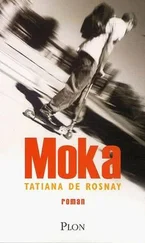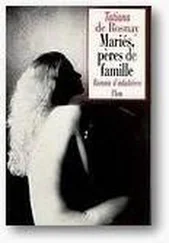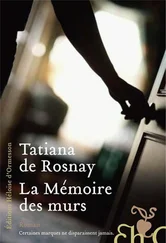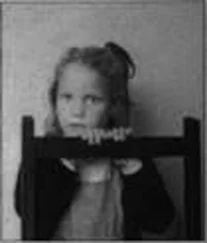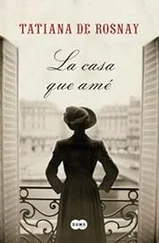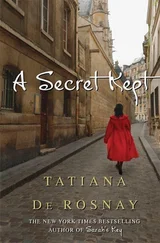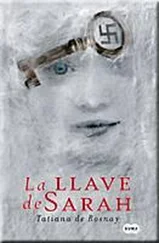Her gnarled old fingers smoothed out her skirt.
“I remember the policemen, you know. Our own good Parisian policemen. Our own good honest gendarmes. Pushing the children onto the buses. Shouting. Using their batons.”
She bent her chin to her chest. She mumbled something I did not catch. It sounded like, “Shame on us all for not having stopped it.”
“You didn’t know,” I said softly, touched by her suddenly watery eyes. “What could you have done?”
“Nobody remembers the Vel’ d’Hiv’ children, you know. Nobody is interested.”
“Maybe this year, they will,” I said. “Maybe this year, it will be different.”
She pursed her shrunken lips.
“No. You’ll see. Nothing has changed. Nobody remembers. Why should they? Those were the darkest days of our country.”

SHE WONDERED WHERE HER father was. Somewhere in the same camp, in one of the sheds, surely, but she only saw him once or twice. She had no notion of the days slipping by. The only thing that haunted her was her brother. She woke at night, trembling, thinking of him in the cupboard. She took out the key and stared at it with pain and horror. Maybe he was dead by now. Maybe he had died of thirst, of hunger. She tried to count the days since that black Thursday the men had come to get them. A week? Ten days? She didn’t know. She felt lost, confused. It had been a whirlwind of terror, starvation, and death. More children had died at the camp. Their little bodies had been taken away amid tears and cries.
One morning, she noticed a number of women talking with animation. They looked worried, upset. She asked her mother what was going on, but her mother said she didn’t know. Not to be deterred, the girl asked a woman who had a little boy her brother’s age, and who had slept next to them for the past few days. The woman’s face was reddish, as if she had a fever. She said there were rumors, rumors going around the camp. The parents were going to be sent East, to work. They were to prepare for the arrival of the children, who were to come later, in a couple of days. The girl listened, shocked. She repeated the conversation to her mother. Her mother’s eyes seemed to click open. She shook her head vehemently. She said no, that couldn’t possibly happen. They couldn’t possibly do that. They couldn’t separate the children from the parents.
In that sheltered, gentle life that seemed far away, the girl would have believed her mother. She used to believe everything her mother said. But in this harsh new world, the girl felt she had grown up. She felt older than her mother. She knew the other women were saying the truth. She knew the rumors were true. She did not know how to explain this to her mother. Her mother had become like a child.
When the men came into the barracks, she did not feel afraid. She felt she had been hardened. She felt a thick wall had grown around her. She took her mother’s hand and held it tight. She wanted her mother to be brave, to be strong. They were ordered outside. They had to file into another shed, by small groups. She waited in line patiently with her mother. She kept looking around her to catch a glimpse of her father. He was nowhere to be seen.
When it was their turn to step into the shed, she saw a couple of policemen sitting behind a table. There were two women standing next to the men, wearing ordinary clothes. Women from the village, looking at the lines of people with cold, hard faces. She heard them ordering the old woman in front of her in the line to hand over money and jewelry. She watched the old woman fumble with her wedding ring, her watch. A little girl of six or seven stood next to her, shivering with fear. A policeman pointed to the tiny gold rings the little girl wore in her ears. She was too frightened to take them off herself. The grandmother bent down to unclasp them. The policeman let out a sigh of exasperation. This was going far too slowly. They’d be here all night at this rate.
One of the village women went over to the small girl and with a quick gesture yanked the rings through her ears, tearing the tiny lobes. The little girl screamed, her hands creeping to her bloody neck. The old woman screamed, too. A policeman hit her in the face. They were pulled outside. A murmur of fear went through the line. The policemen waved their guns. There was silence.
The girl and her mother had nothing to hand over. Just the mother’s wedding band. A florid-faced village woman tore open the mother’s dress from collarbone to navel, revealing her pale skin and faded underclothes. Her hands groped through the folds of the dress, to the under-clothes, to the openings of the mother’s body. The mother flinched, but said nothing. The girl watched, fear rising through her. She hated the way the men eyed her mother’s body, hated the way the village woman touched her, handling her like a piece of meat. Were they going to do that to her, too, she wondered. Would they tear her clothes as well? Maybe they would take her key. She clenched it in her pocket with all her might. No, they couldn’t take that. She wouldn’t let them. She wouldn’t let them take the key to the secret cupboard. Never.
But the policemen were not interested in what was in her pockets. Before she and her mother stepped aside, she had one last look at the growing piles on the desk: necklaces, bracelets, brooches, rings, watches, money. What were they going to do with all that? she thought. Sell them? Use them? What did they need these things for?
Back outside, they were lined up again. It was a hot and dusty day. The girl was thirsty, her throat felt prickly and dry. They stood around for a long time, under the policemen’s silent glare. What was going on? Where was her father? Why were they all standing there? The girl could hear incessant whispers behind her. Nobody knew. Nobody could answer. But she knew. She felt it. And when it happened, she was expecting it.
The policemen fell upon them like a swarm of large, dark birds. They dragged the women to one side of the camp, the children to the other. Even the tiniest children were separated from their mothers. The girl watched it all, as if she was in another world. She heard the screams, the yells, she saw the women hurling themselves to the ground, their hands pulling at their children’s clothes, their children’s hair. She watched the policemen raise their truncheons and bludgeon the women’s heads, their faces. She saw a woman collapse, her nose a bloody pulp.
Her own mother stood next to her, frozen. She could hear the woman breathing in short, sharp gasps. She held on to her mother’s cold hand. She felt the policemen wrench them apart, she heard her mother shriek, and then saw her dive back toward her, her dress gaping open, her hair wild, her mouth contorted, screaming her daughter’s name. She tried to grab her mother’s hands, but the men shoved her aside, sending her to her knees. Her mother fought like a mad creature, overpowering the policemen for a couple of seconds, and at that precise moment, the girl saw her real mother emerge, the strong, passionate woman she missed and admired. She felt her mother’s arms hold her once more, felt the thick bushy hair caress her face. Suddenly torrents of cold water blinded her. Spluttering, gasping for breath, she opened her eyes to see the men drag her mother away by the collar of her sopping dress.
It seemed to her that it took hours. Tearful, lost children. Buckets of water thrown in their faces. Struggling, broken women. Sharp thuds of the blows. But she knew it had happened very fast.
Silence. It was done. At last, the crowd of children stood on one side, the women on the other. Between them, a sturdy row of policemen. The policemen kept repeating that the mothers and children over twelve were preceding the others, that the younger ones would leave next week, to join them. The fathers has already left, they were told. Everybody was to cooperate and obey.
Читать дальше


